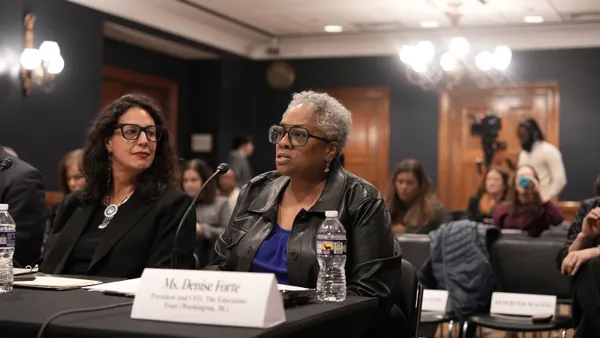Dive Brief:
- Although Title I schools must reserve a portion of federal funding specifically for family engagement activities, there is little difference between how parents from Title I and non-Title I schools get school communications and participate in school activities. This finding reveals a need for the U.S. Department of Education to update guidance on parent engagement for schools that serve mostly low-income students, a U.S. Government Accountability Office report released Wednesday said.
- The existing Education Department guidance, issued in 2004, contains outdated and missing information about Title I, Part A requirements to conduct certain parent and family engagement activities.
- School-family connections have been shown to have positive impacts on students' attendance, academic performance and graduation rates, the report said. Post-pandemic, schools have been working to strengthen family engagement and collaboration as some organizations have warned that growing school-centered political activism does not represent effective family engagement practices.
Dive Insight:
In response to a draft of the GAO report, the Education Department said effective parent and family engagement is a high priority area. The department "will be taking expeditious steps" to update its family engagement guidance and plans further technical assistance in this area, the department told GAO.
GAO's research was done at the request of Rep. Virginia Foxx, R-North Carolina, who chairs the House Committee on Education and the Workforce, and Rep. Elise Stefanik, R-New York, a committee member.
Title I has separate parent and family engagement requirements for districts and schools, as well as requirements that apply to both. For example, Title I districts must create a written parent and family engagement policy in collaboration with parents and family members. Title I schools are required to hold an annual meeting for families — at a convenient time — to explain the school’s Title I participation, its parent and family engagement requirements, and the right of parents to be involved.
GAO found the decades-old guidance does not make clear that districts must prioritize schools with low-income populations when distributing funds for parent and family engagement activities, as required by law. Some state officials who GAO researchers interviewed called the guidance "confusing," according to the report.
“Absent updated guidance, states, districts, and schools may continue to rely on obsolete information to guide their parent and family engagement efforts," the report said.







 Dive Awards
Dive Awards



